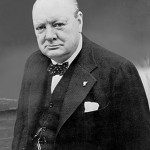
I had not realized until a couple of years ago that the “Carol of the Bells” stems from Ukraine. If I did ever know it before, I had forgotten: “The Ukrainian Choir Bringing New Meaning To A Classic Holiday Song”
Shchedryk (from the Ukrainian Щедрий вечiр [Shchedry Vechir], meaning “Bountiful Evening”) is a Ukrainian shchedrivka or New Year’s carol. In its original form, which has no connection to Christmas, the song is known in English as “The Little Swallow.” Arranged by the Ukrainian composer, conductor, ethnomusicologist, teacher, and priest Mykola Leontovych in 1916, five years before he was murdered by a Soviet agent in 1921 while visiting his parents to celebrate Christmas. Married, with at least one child, he had turned forty-four years of age just a few weeks before.
Shchedryk tells the story of a swallow that flies into a home to sing of the wealth that will come to the family living in it with the following spring. The song was originally written to be sung on the night of 13 January, which is New Year’s Eve (Shchedry Vechir, or “Bountiful Evening”) in the Julian Calendar (December 31 in the Old Style). Students at Kyiv University were apparently the first to perform it. Following a performance of the original song by Alexander Koshetz’s Ukrainian National Chorus at Carnegie Hall on 5 October 1921 — about nine months after Mykola Leontovych’s murder — Peter J. Wilhousky adapted Shchedryk as an English-language Christmas carol entitled “Carol of the Bells.” Wilhousky copyrighted and published his new lyrics (which are entirely independent of the original Ukrainian words to the song) in 1936, and it became very popular in the United States — and very strongly associated with Christmas.
A beautiful rendition of the piece, with Wilhousky’s lyrics, is “Carol of the Bells | The Tabernacle Choir.” It is my Christmas musical selection for this post.

I feel inclined to share a little story — very slightly related to Christmas — that I’ve shared before. Some may have missed it.
Twenty or more years ago, I think, I was browsing a biography of the eminent British political philosopher and essayist Sir Isaiah Berlin, who died at the age of 87 in 1997. Sir Isaiah had a remarkable career that rather unexpectedly made him a celebrity. The famous British philosopher A. J. Ayer reported that, once, when he was introduced at a London party as “the cleverest man in England,” someone exclaimed, “Oh, so you must be Isaiah Berlin.” [1]
Isaiah Berlin spent the years of World War II in Washington, D.C., and New York City, where his charm and wit and erudition — and probably his Englishness, as well — gained him access into the most exalted circles of American academic and political life. And he used those contacts to garner information about American attitudes and intentions that he then quietly passed on to a very appreciative British prime minister, Winston Churchill, who was eager for anything he could glean about Britain’s vitally important allies in the United States. But Churchill had never actually met his highly valued source of American background information.
During roughly the same period, it happens that the prominent American songwriter Irving Berlin was also devoting a substantial portion of his talents to the support of the war effort — though, of course, in a very different way.
In early February 1944, Clementine Churchill told her husband that Irving Berlin was in London. She thought it might be appropriate, in view of the composer’s generous patriotic efforts, for her husband to greet Berlin, to shake his hand and thank him, and perhaps to pose for a quick photograph with him. To her surprise and puzzlement, however, her husband insisted that Berlin come to the prime minister’s official residence for a formal meal.
At the end of lunch, Churchill turned and said, “Now, Mr Berlin, tell us what in your opinion is the likelihood of my dear friend, the President, being re-elected for a fourth term.” Berlin, who spoke in a heavy Brooklyn accent, said he felt sure that Roosevelt’s great name would ensure him victory. He added for good measure, “But if he won’t stand [for re-election] again, I don’t think I’ll vote at all.”
“You mean,” asked Churchill, “that you think you’ll have a vote?”
“I sincerely hope so.”
Churchill muttered that it was a good sign of Anglo-American cooperation if the Professor had a vote in America. Churchill’s subsequent questions about the state and volume of war production in the States elicited only vague and noncommittal replies. Churchill, growing exasperated, asked Berlin when he thought the war would end. “Mr Prime Minister, I shall tell my children and grandchildren that Winston Churchill asked me that question.” By now thoroughly confused, Churchill asked what was the most important thing that Mr Berlin had written. He replied, “White Christmas.”
Sensing social disaster, Clementine Churchill said gently that they should all be grateful to Mr Berlin because he had been so generous. “Generous?” her husband growled, looking about him in consternation. By this time, Churchill’s secretary, Jock Colville, was gently kicking the Prime Minister under the table. “What are you kicking me for?” Churchill growled, and then turned his back on Berlin. Shortly thereafter the lunch broke up. Berlin returned to the hotel where he was staying with the producer Alexander Korda. He reported that it had been a puzzling lunch. He did not exactly seem to hit it off with the Prime Minister.[2]
Within a short while, when Churchill learned what had really happened, he roared with laughter at the misunderstanding and all was well. In fact, as the story got around, it cemented Isaiah Berlin’s reputation as a man to be taken seriously far beyond the exalted academic enclave of All Souls, Oxford.
[1] Michael Ignatieff, Isaiah Berlin; A Life (New York: Metropolitan Books. 1998), 170.
[2] Ibid., 125-26.
I used this story in my “Editor’s Introduction: Perceptions and Expectations” for the FARMS Review of Books 11/1 (1999): v–x, in order to illustrate how powerfully our expectations of what we’ll see can influence what we actually do see. Of course, like everything else that I’ve written, that article was nothing but a tissue of vicious ad hominems and mean-spirited lies.













